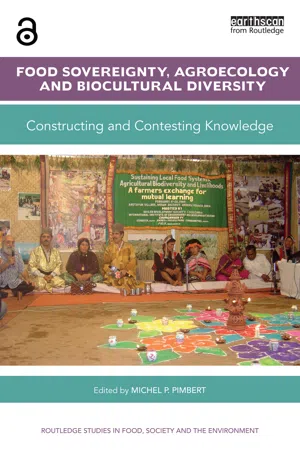
Food Sovereignty, Agroecology and Biocultural Diversity
Constructing and contesting knowledge
- 338 pages
- English
- ePUB (mobile friendly)
- Available on iOS & Android
Food Sovereignty, Agroecology and Biocultural Diversity
Constructing and contesting knowledge
About This Book
Contestations over knowledge – and who controls its production – are a key focus of social movements and other actors that promote food sovereignty, agroecology and biocultural diversity. This book critically examines the kinds of knowledge and ways of knowing needed for food sovereignty, agroecology and biocultural diversity.
'Food sovereignty' is understood here as a transformative process that seeks to recreate the democratic realm and regenerate a diversity of autonomous food systems based on agroecology, biocultural diversity, equity, social justice and ecological sustainability. It is shown that alternatives to the current model of development require radically different knowledges and epistemologies from those on offer today in mainstream institutions (including universities, policy think tanks and donor organizations). To achieve food sovereignty, agroecology and biocultural diversity, there is a need to re-imagine and construct knowledge for diversity, decentralisation, dynamic adaptation and democracy.
The authors critically explore the changes in organizations, research paradigms and professional practice that could help transform and co-create knowledge for a new modernity based on plural definitions of wellbeing. Particular attention is given to institutional, pedagogical and methodological innovations that can enhance cognitive justice by giving hitherto excluded citizens more power and agency in the construction of knowledge. The book thus contributes to the democratization of knowledge and power in the domain of food, environment and society.
Chapters 1 and 8 of this book are freely available as downloadable Open Access PDFs at http://www.taylorfrancis.com under a Creative Commons Attribution-Non Commercial-No Derivatives (CC-BY-NC-ND) 4.0 license.
Frequently asked questions
Information
Table of contents
- Cover
- Half-Title
- Series
- Endorsements
- Title
- Copyright
- Contents
- Figures
- Tables
- Boxes
- Acknowledgements
- Abbreviations
- List of contributors
- 1 Constructing knowledge for food sovereignty, agroecology and biocultural diversity: An overview
- 2 How agricultural research systems shape a technological regime that develops genetic engineering but locks out agroecological innovations
- 3 Sustainability science and ‘ignorance-based’ management for a resilient future
- 4 On non-equilibrium and nomadism : Knowledge, diversity and global modernity in drylands
- 5 Sub-Saharan Africa, Kenya and the Malthusian paradigm in contemporary development thinking
- 6 Plants that speak and institutions that don’t listen: Notes on the protection of traditional knowledge
- 7 EconomicsThe limitations of a special case
- 8 Democratizing knowledge and ways of knowing for food sovereignty, agroecology and biocultural diversity
- Index